The Drug Education Forum has a history of supporting the development of practice and policy. These papers have been produced with the aim of helping those engaged in practice to address issues that we believe are important to meeting the needs of children and young people.
Download all the papers and presentation.
The principles of good drug education
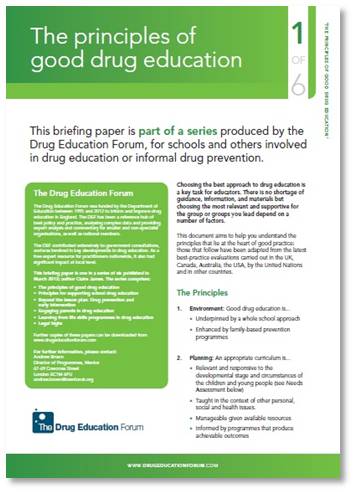 Choosing the best approach to drug education is a key task for educators. There is no shortage of guidance, information, and materials but choosing the most relevant and supportive for the group or groups you lead depend on a number of factors.
Choosing the best approach to drug education is a key task for educators. There is no shortage of guidance, information, and materials but choosing the most relevant and supportive for the group or groups you lead depend on a number of factors.
This paper aims to help you understand the principles that lie at the heart of good practice based on the latest best-practice evaluations carried out in the UK, Canada, Australia, the USA, by the United Nations and in other countries.
The principles for supporting school drug education
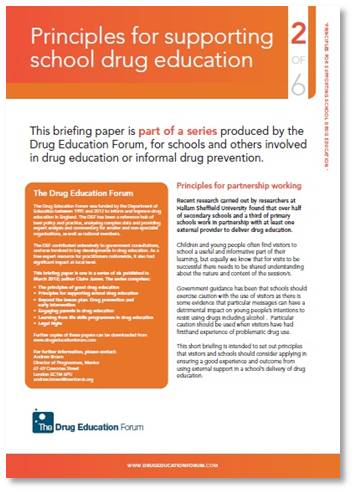 Children and young people often find visitors to school a useful and informative part of their learning, but for visits to be successful there needs to be a shared understanding about the nature and content of the sessions.
Children and young people often find visitors to school a useful and informative part of their learning, but for visits to be successful there needs to be a shared understanding about the nature and content of the sessions.
This paper is intended to set out principles that visitors and schools can consider applying to ensure better outcomes from using external support in a school’s delivery of drug education.
Beyond the lesson plan
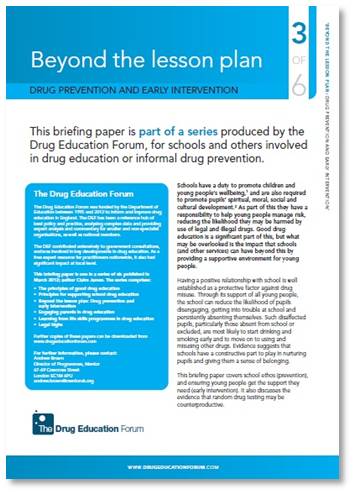 Schools have a duty to promote the wellbeing of their pupils. They have a responsibility to help them manage risk, reducing the likelihood they can be harmed by the use of legal or illegal drugs.
Schools have a duty to promote the wellbeing of their pupils. They have a responsibility to help them manage risk, reducing the likelihood they can be harmed by the use of legal or illegal drugs.
This briefing paper covers how a school’s ethos, rules and early identification and interventions to address problems can be used to protect pupils from harm.
It also addresses a number of tactics that have been shown to be ineffective.
Engaging parents in drug education
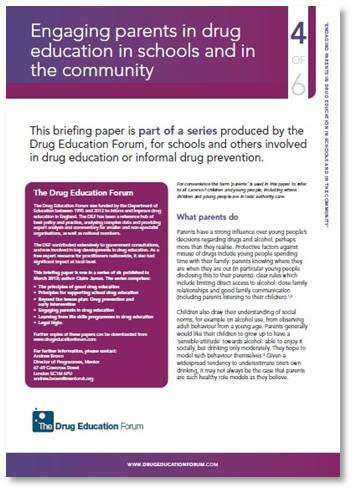 Parents have a strong influence over their children’s decisions regarding drugs and alcohol, perhaps more than they realise.
Parents have a strong influence over their children’s decisions regarding drugs and alcohol, perhaps more than they realise.
This paper describes some of the ways in which schools and other services can help parents deal with these issues, from simple information, to combining classroom work with their engagement with parents, to supporting parenting courses.
Learning from life skills programmes
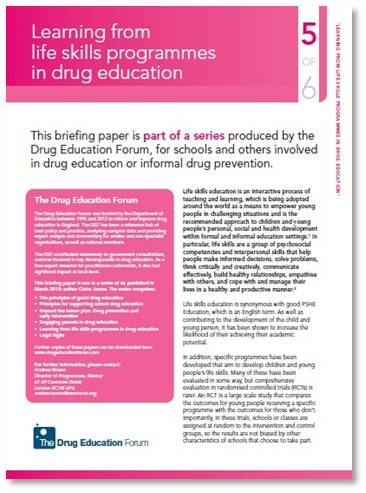 Life skills education is an interactive process of teaching and learning which is being adopted around the world as a means of empowering young people.
Life skills education is an interactive process of teaching and learning which is being adopted around the world as a means of empowering young people.
Life skills education is synonymous with good PSHE education and has been shown to increase the likelihood that young people avoid the harms that drugs and alcohol can do.
The paper looks specifically at two programmes, Life Skills Training and Unplugged, examining the evidence for effectiveness and the content and processes that they share.
Legal Highs
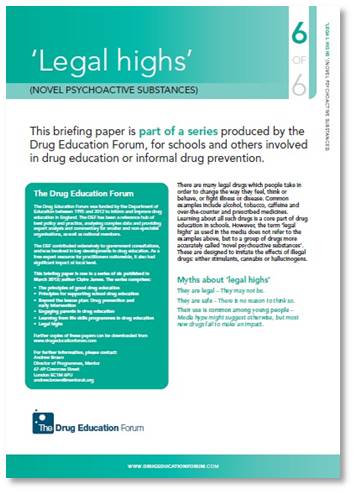 In the last few years there has been a lot of attention to a number of new drugs, often known as ‘legal highs’. These drugs have been designed to mimic the effects of illegal drugs.
In the last few years there has been a lot of attention to a number of new drugs, often known as ‘legal highs’. These drugs have been designed to mimic the effects of illegal drugs.
This paper looks at some of the myths that have developed about legal highs, at how drug educators can best approach the issue, and how to integrate legal highs into good drug education.